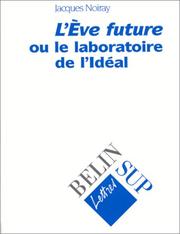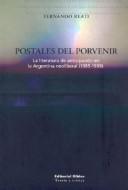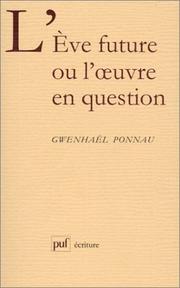| Listing 1 - 8 of 8 |
Sort by
|
Book
Abstract | Keywords | Export | Availability | Bookmark
 Loading...
Loading...Choose an application
- Reference Manager
- EndNote
- RefWorks (Direct export to RefWorks)
Book
ISBN: 9782895180340 2895180342 Year: 1999 Volume: 16 Publisher: Québec: Nota bene,
Abstract | Keywords | Export | Availability | Bookmark
 Loading...
Loading...Choose an application
- Reference Manager
- EndNote
- RefWorks (Direct export to RefWorks)
Science fiction --- Future in literature. --- Science-fiction --- Futur dans la littérature --- History and criticism. --- Histoire et critique --- History and criticism --- Future in literature --- Future, The, in literature. --- Futur dans la littérature --- Science fiction - History and criticism

ISBN: 2701126371 9782701126371 Year: 1999 Publisher: Paris: Belin,
Abstract | Keywords | Export | Availability | Bookmark
 Loading...
Loading...Choose an application
- Reference Manager
- EndNote
- RefWorks (Direct export to RefWorks)

ISBN: 9789507865299 9507865292 Year: 2006 Publisher: Buenos Aires: Biblos,
Abstract | Keywords | Export | Availability | Bookmark
 Loading...
Loading...Choose an application
- Reference Manager
- EndNote
- RefWorks (Direct export to RefWorks)
Argentine literature --- Future, The, in literature --- Politics and literature --- Neoliberalism --- History and criticism --- Future in literature. --- Future, The, in literature. --- History and criticism. --- Argentine literature - 20th century - History and criticism --- Politics and literature - Argentina --- Neoliberalism - Argentina
Book
ISBN: 9781409400394 9780754699088 1409400395 0754699080 1315263920 1282524755 9786612524752 1351962515 9781409475750 1409475751 9781282524750 9781351962513 9781315263922 6612524758 9781351962490 9781138268081 1351962507 Year: 2010 Publisher: Farnham: Ashgate,
Abstract | Keywords | Export | Availability | Bookmark
 Loading...
Loading...Choose an application
- Reference Manager
- EndNote
- RefWorks (Direct export to RefWorks)
In his provocative and timely study of posthumanism, Dongshin Yi adopts an imaginary/imaginative approach to exploring the transformative power of the cyborg, a strategy that introduces balance to the current discourses dominated by the practicalities of technoscience and the dictates of anthropocentrism. Proposing the term "cyborgothic" to characterize a new genre that may emerge from gothic literature and science fiction, Yi introduces mothering as an aesthetic and ethical practice that can enable a posthumanist relationship between human and non-human beings. Yi examines the cyborg's literary manifestations in novels, including The Mysteries of Udolpho, Frankenstein, Dracula, Arrowsmith, and He, She and It, alongside philosophical and critical texts such as Edmund Burke's A Philosophical Enquiry into the Origins of Our ideas of the Sublime and Beautiful, Immanuel Kant's Critique of Judgment, John Stuart Mill's Utilitarianism and System of Logic, William James's essays on pragmatism, ethical treaties on otherness and things, feminist writings on motherhood, and recent studies of posthumanism. Arguing humans imagine the cyborg in ways that are seriously limited by fear of the unknown and current understandings of science and technology, Yi identifies in gothic literature a practice of the beautiful that extends the operation of sensibility, heightened by gothic manifestations or situations, to surrounding objects and people so that new feelings flow in and attenuate fear. In science fiction, which demonstrates how society has accommodated science, Yi locates ethical corrections to the anthropocentric trajectory that such accommodation has taken. Thus, A Genealogy of Cyborgothic imagines a new literary genre that helps envision a cyborg-friendly, non-anthropocentric posthuman society. Encoded with gothic literature's aesthetic embrace of fear and science fiction's ethical criticism of anthropocentrism, the cyborgothic retains the prospective nature of these genres and develops mothering as an aesthetico-ethical practice that both humans and cyborgs should perform.
English literature --- American literature --- Ethics in literature. --- Literature and morals. --- Future, The, in literature. --- History and criticism --- Theory, etc. --- English literature -- History and criticism -- Theory, etc. --- Future in literature. --- Ethics in literature --- Literature and morals --- Future, The, in literature --- Languages & Literatures --- English --- English Literature --- Literature - General --- Theory, etc --- Future in literature --- Literature --- Morals and literature --- Influence --- Moral and ethical aspects --- Ethics --- English literature - History and criticism - Theory, etc. --- American literature - History and criticism - Theory, etc.
Book
ISBN: 9783100168030 3100168038 Year: 2014 Publisher: Frankfurt am Main: S. Fischer,
Abstract | Keywords | Export | Availability | Bookmark
 Loading...
Loading...Choose an application
- Reference Manager
- EndNote
- RefWorks (Direct export to RefWorks)
Social prediction --- Civilization, Modern --- Future, The --- Future, The, in literature --- Future, The, in motion pictures --- Forecasting --- Future in motion pictures --- Future in literature --- Modern civilization --- Modernity --- Prediction, Social --- Social forecasting --- Sociological prediction --- Apokalyptik. --- Future, The, in literature. --- Future, The, in motion pictures. --- Future, The. --- Katastrophe. --- Kultur. --- Social prediction. --- Zukunftsangst. --- Forecasting. --- 2000-2099. --- Civilization, Modern - 21st century - Forecasting

ISBN: 213050339X 9782130503392 Year: 2000 Volume: *119 Publisher: Paris: PUF,
Abstract | Keywords | Export | Availability | Bookmark
 Loading...
Loading...Choose an application
- Reference Manager
- EndNote
- RefWorks (Direct export to RefWorks)
Literature --- Future in literature. --- French literature --- History and criticism. --- Villiers de l'Isle-Adam, Auguste, --- Villiers de L'Isle-Adam, Auguste, --- Criticism and interpretation --- Villiers de L'Isle-Adam, Auguste --- French literature - 19th century - History and criticism. --- Villiers de l'Isle-Adam, Auguste, - comte de, - 1838-1889 - Criticism and interpretation --- Villiers de L'Isle-Adam, Auguste, - comte de, - 1838-1889. - Ève future --- Villiers de l'Isle-Adam, Auguste, - comte de, - 1838-1889
Book
ISBN: 9782353410200 9782353410354 2353410200 2353410359 Year: 2008 Publisher: Paris: Max Milo,
Abstract | Keywords | Export | Availability | Bookmark
 Loading...
Loading...Choose an application
- Reference Manager
- EndNote
- RefWorks (Direct export to RefWorks)
Comment fixer à l'oeil nu le présent de notre histoire humaine, toujours intolérable à une âme minimalement sensible ? En rêvant ses non-dits et ses fausses promesses. Depuis quelques décennies, la littérature dite de "science-fiction" s'y emploie. On conçoit généralement la SF comme la tentative d'imaginer des futurs inimaginables. Son sujet, démontre Fredric Jameson, c'est plutôt le devenir actuel de notre destin collectif.Il ne s'agit pas pour les auteurs analysés dans ce recueil - Philip K. Dick, Ursula Le Guin, Brian Aldiss, Vonda McIntyre, Kim Stanley Robinson ou encore William Gibson... - de nous donner des "images" du futur pour nous endormir ou nous libérer du quotidien, comme le croient encore certains critiques littéraires qui persistent à ne pas prendre l'effort d'anticipation au sérieux : la force de la science-fiction est de défamiliariser et de restructurer l'expérience que nous avons de notre présent, et ce sur un mode spécifique, nouveau, fertile en soi et pour la pensée.La motivation profonde de la SF et du roman d'anticipation est de faire percevoir, sur un mode local et déterminé, avec une plénitude de détails concrets, notre incapacité constitutionnelle à imaginer un avenir autre. Si l'imagination individuelle y semble riche, c'est qu'elle dévoile a contrario la pauvreté mimétique, la clôture systémique, culturelle et idéologique qui nous retient tous prisonniers.
Science fiction, American --- Science fiction, English --- Science fiction --- Utopias in literature --- Future in literature --- History and criticism --- Theory, etc. --- Futur dans la littérature --- Future, The, in literature. --- Futur dans la littérature --- Utopias --- Utopies --- Utopies dans la littérature --- Science-fiction anglaise --- Science-fiction américaine --- Utopies littéraires. --- Science fiction, American - History and criticism --- Science fiction, English - History and criticism --- Science fiction - History and criticism - Theory, etc. --- Louvet, Jean
| Listing 1 - 8 of 8 |
Sort by
|

 Search
Search Feedback
Feedback About UniCat
About UniCat  Help
Help News
News